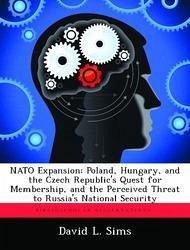The North Atlantic Treaty Organization's (NATO) Partnership for Peace (PFP) initiative was unveiled at the January 1994 NATO summit at Brussels, Belgium. PFP contained, in part, the Alliance's response to the challenge since the end of the Cold War whether, when, and how to expand eastwards. Twenty-seven countries, including Russia, have formally taken up NATO's open-ended offer of closer political and military cooperation. Poland, Hungary, and the Czech Republic have been the loudest in expressing their desire for full NATO membership. With the end of the Cold War, Russia has lost the hegemony it won over East Central Europe in 1945, an objective deeply rooted in Russian history, and with it the buffer it deemed necessary for its protection. Many in Russia have voiced their intentions to ensure this region remains within the country's sphere of influence and are vehemently opposed to NATO expansion. This paper proposes that NATO expansion into East Central Europe is ill advised at this pivotal period in Russian history, and should be delayed until the Russian economy and democratic government become more stable. It also argues that the prospects for long-term political and economic stability in East Central Europe rests not with NATO, but in the European Union (EU). Following an in-depth analysis of Russian and East Central European history in conjunction with a comprehensive review of the current literature on NATO expansion, this study concludes that admitting Poland, Hungary, and the Czech Republic is fraught with danger. It is likely to foster insecurity, and not the intended enhanced European security framework NATO seeks. NATO expansion in the region also might precipitate Russian's estrangement and the redivision of Europe into two competitive spheres, the same divisions it spent four decades trying to erase.
Hinweis: Dieser Artikel kann nur an eine deutsche Lieferadresse ausgeliefert werden.
Hinweis: Dieser Artikel kann nur an eine deutsche Lieferadresse ausgeliefert werden.








